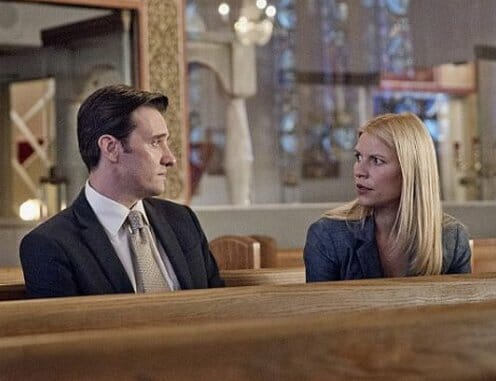Homeland: “A Red Wheelbarrow” (Episode 3.08)

Last night’s Homeland went back to the literary well again, this time drawing its name from a William Carlos Williams poem colloquially referred to as “A Red Wheelbarrow.” In essence, reading the poem suggests that as we learn the layers of a situation, we gain more and more perspective. With each line, another detail is added to the picture Williams paints, and what starts with just a wheelbarrow becomes the story, itself.
Ultimately, as Williams writes, it all depends on the wheelbarrow. Unfortunately, for the most part, Homeland’s has become a creaky John Deere with splintered wood handles and a nail or two through its tire in danger of overturning its contents during this third season. Like Williams’ poem, there were a lot of layers to last night’s episode, but the way they are connecting is painting a jagged picture.
At the same time, last week’s “Gerontion” was just as uneven as this hour, but the thematic motif ran strongly throughout the episode. I felt like my recap could’ve consisted entirely of comparing passages of the Eliot poem to elements of the episode. While this week’s final 15 minutes were excellent—honestly the first time I felt my hair stand on end in a year-plus—and bringing Brody back into play is going to accelerate things quickly in the season’s final four episodes, the wheelbarrow carrying us to the finish line remains pretty wobbly.
So much really depends upon Carrie, the show’s tortured heroine and one of the few people we’ve been asked consistently to continue to root for over the last three years. But at this point, how many more times can she come “this close” to ruining another mission by jumping out of the CIA surveillance van? Can’t Virgil put child locks on the doors or something when she’s involved?
When Quinn’s silenced bullet went through her bicep, it brought with it an end to the last shreds of credibility Carrie possessed as a CIA agent and strong leading female character. When we first met her, she had agency, power and resolve. From early on (and even into this season’s first third as dirty doctors pumped her veins full of thorazine), she was willing to do whatever it took for her mission to succeed. Her 9/11 guilt fueled her; she had to be the best agent because she couldn’t allow herself to be so wrong again. After being led to believe she’d been wrong about Brody, it destroyed her. Her duty was paramount; everything else was secondary.
But somewhere between a remote pacemaker and a covert Canadian border crossing, a switch flipped in Carrie’s cerebral cortex and she became—pardon me—crazy in love. Over the last few weeks, we were forced to come to terms with the fact that Carrie’s ultimate goal remained clearing Brody’s name for the good of their (ugh) unborn child. Nothing else mattered. I’d said for weeks she was holding a candle for him; with the lighting of a votive before meeting with Franklin, things were set ablaze.
-

-

-

-

-

-

-

-

-

-

-

-

-

-

-

-

-

-

-

-

-

-

-

-

-

-

-

-

-

-

-

-

-

-

-

-

-

-

-

-








































